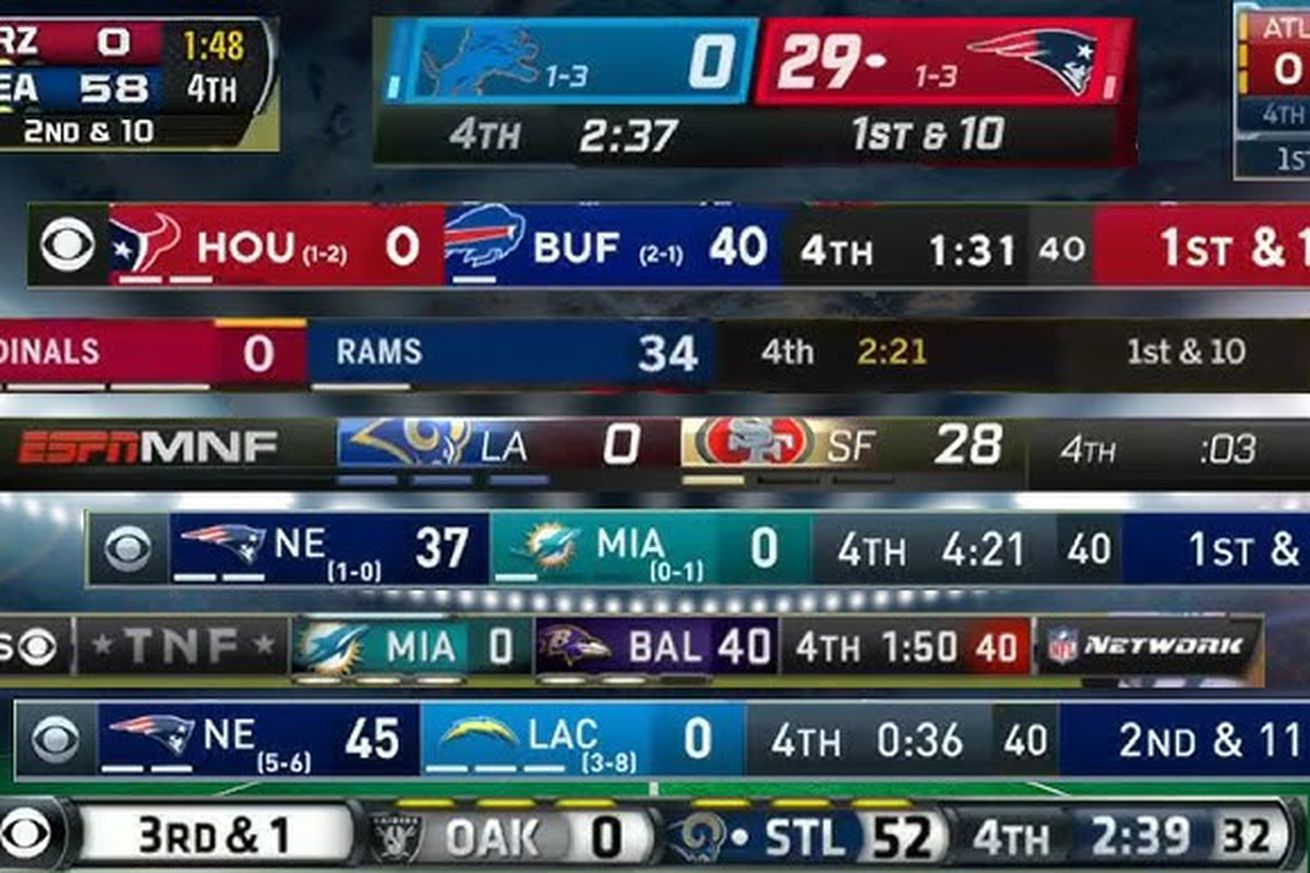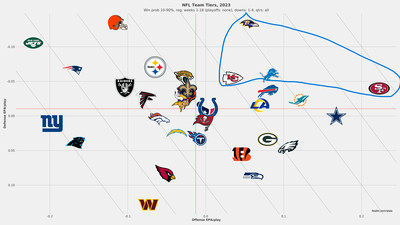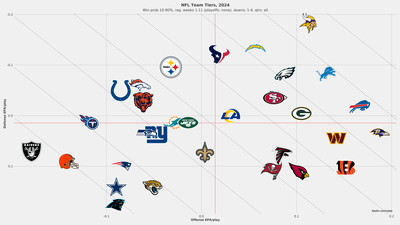
Does piling on in garbage time really help playoff success?
As the Minnesota Vikings completed their sweep of the AFC South with a 23-13 win over the Titans, the Detroit Lions curb-stomped the Jaguars 52-6 – a team the Vikings struggled to prevail against the previous week 12-7. And the Lions put up 52 points against the Titans as well in another curb-stomping. The Vikings did manage to blowout the Texans 34-7, the only team in the AFC South with a winning record, while the Lions were lucky to get out of Houston with a 26-23 win.
Overall, the Lions hold a commanding lead in point differential across the league at +159, with the Bills the only other team above one hundred at +106. 122 of the Lions’ 159-point differential came in blowouts against the Cowboys, Titans, and Jaguars- three teams likely to be picking in the top ten in next year’s draft. Still, blowing out the bottom feeders- rather than beating them in closer games like the Vikings have- is a sign of strength and a bona fide Super Bowl favorite- right? After all, the Lions are now the favorite to win the Super Bowl this year after that blowout of the Jags (and the Chiefs losing to the Bills). Certainly as Vikings’ fans we’d feel better about our team’s chances by curb-stomping the cellar-dwellers of the AFC South like the Lions have, rather than these lame single-digit average point margin victories.
Point Differential and Playoff Success
But at the end of the day, what difference does point differential make when it comes to what really matters- success in the playoffs?
The short answer is not much. The top team in point differential doesn’t usually win the Super Bowl. Over the last ten Super Bowls, only three times has the team with the best point differential won, the last coming in 2017, when the Eagles won although they were actually tied with the Patriots for best point differential. The Patriots had the best point differential in 2014 and 2016 when they won the Super Bowl.
Super Bowl participants usually have a +100 or better point differential, the exceptions being the Chiefs last season, the 2021 Rams and Bengals, and the 2015 Broncos over the past ten seasons. Also, teams with a lower point differential under 50 tend not to make it that far in the post season and usually only beat teams with a low point differential. In that sense, a relatively low point differential is a much stronger negative indicator of playoff performance than high point differential is a strong indicator of playoff success.
High Point Differential Warning Sign
Playoff teams with high positive point differential in recent years that did not fare well in the playoffs shared something that should worry Lions fans: they blew-out bad teams but had more mixed success against better teams and the results were close. The 2023 Cowboys, the 2022 Bills, the 2021 Cowboys, the 2021 Bills, the 2020 Ravens, and the 2019 Patriots all led their conference in point differential, most of which came in blowouts of bad teams, but made early exits from the playoffs.
Better, but Imperfect, Predictors of Playoff Success
So, while point differential is a flawed indicator of playoff success, in large part because blowouts of bad teams can overstate a team’s strength against other playoff teams, there are some other indicators that have a good track record of forecasting playoff success.
Playoff Seeding
The best one is playoff seeding. #1 seeds win the Super Bowl just over half the time since playoff seeding began for the 1976 season, including five of the last ten. However, the top seed in either conference has only won one of the last six Super Bowls, so maybe that’s not as good a predictor as it once was. Clearly having a first-round bye and home field throughout the conference championship is a significant advantage, but obviously not a decisive one in every instance.
Second seeds have had the second-most success in winning Super Bowls, but that has likely changed now that second seeds no longer get a first-round bye. Fourth seeds have the third best track record at winning Super Bowls, while the others have only won it 2-3 times each except seventh seeds which have never won.
Another downside of playoff seeding is that you don’t know it until a week or two before the postseason and it can be difficult to gauge during the ‘any given Sunday’ NFL season.
EPA-Based Team Tiers – with a Garbage Time Filter
I went through some recent history going back to 2018 to see how EPA-based team metrics for overall offense and defense work in forecasting teams that make it to the conference championships. I found that after experimenting with four different garbage time filters (10%, 16%, 20%, 30%), using the 10% garbage time filter, which excludes plays when the expected win percentage is over 90% or less than 10%, produced the best results over time- albeit still imperfect ones. But using a garbage time filter almost always improved the results.
2023 Season
A 30% garbage time filter did a better job of predicting last year’s conference championship teams than the 10% filter shown underneath, as it improved the tiers for both the Lions and Chiefs.


2022 Season
The 10-90% garbage time filter did the best job of any (or no) filter in predicting the teams that made it to the conference championship in 2022.

2021 Season
No filter did a good job predicting the 2021 conference championship teams. The biggest issue was the Bengals, although none did a good job of filtering out the Packers, Cards, Cowboys, and Bills either.

2020 Season
The 90-10% filter did a good job in 2020 of predicting the conference championship teams, although no garbage time filter did well too.

2019 Season
The Titans were not predicted by any metric to make the AFC conference championship in 2019, including using any garbage time filter, seeding, etc. Overall, outside of the Ravens being upset by the Titans, the 90-10% filter did a pretty good job, however and showed the Vikings’ upset of the Saints wasn’t that big of an upset despite the Saints as 7.5 favorites.

2018 Season
Decent results for predicting the 2018 conference championship teams as well. Bears losing to the Eagles was an upset (the double-doink game), but otherwise not too bad.

Injuries Always a Complicating Factor
Whatever metric is used to predict playoff success, injuries always present a complicating factor. Teams with key injured players during the season that get healthy may perform better in the playoffs than expected based on any number of metrics. Conversely, healthier teams that suffer key injuries late in the season or during the playoffs may fare worse than any kind of performance metric would suggest.
What Does It All Mean for This Season?
Well, the regular season isn’t over yet and anything can and will happen between now and the post-season that could change the outlook for any number of potential playoff teams. Using the 90-10% garbage time filter as above, however, suggests that the Vikings are on the right track at the moment:

In fact, the Vikings look better than many think at the moment, particularly in the national media. Obviously the Lions are the clear favorite to win the Super Bowl right now, or at least represent the NFC, and deservedly so as they beat the Vikings narrowly and have the best record, but how things play out remains to be seen.
Stay tuned.
Follow me on X and Bluesky @wludford